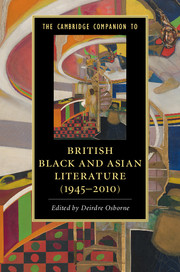Book contents
- Frontmatter
- Dedication
- Contents
- Contributors
- Acknowledgements
- Timeline
- Introduction
- PART I TRACES AND ROUTES
- PART II TRANSLOCATIONS AND TRANSFORMATIONS
- PART III RESTORATIONS AND RENOVATIONS
- 7 Recalibrating the Past: The Rise of Black British Historical Fiction
- 8 Black Women Subjects in Auto/biographical Discourse
- 9 British Black and Asian LGBTQ Writing
- 10 The Poetics and Politics of Spoken Word Poetry
- 11 Post-colonial Plurality in Fiction
- PART IV NATIONAL, INTERNATIONAL, TRANSGLOBAL
- Further Reading
- Index
- Series list
11 - Post-colonial Plurality in Fiction
from PART III - RESTORATIONS AND RENOVATIONS
Published online by Cambridge University Press: 05 September 2016
- Frontmatter
- Dedication
- Contents
- Contributors
- Acknowledgements
- Timeline
- Introduction
- PART I TRACES AND ROUTES
- PART II TRANSLOCATIONS AND TRANSFORMATIONS
- PART III RESTORATIONS AND RENOVATIONS
- 7 Recalibrating the Past: The Rise of Black British Historical Fiction
- 8 Black Women Subjects in Auto/biographical Discourse
- 9 British Black and Asian LGBTQ Writing
- 10 The Poetics and Politics of Spoken Word Poetry
- 11 Post-colonial Plurality in Fiction
- PART IV NATIONAL, INTERNATIONAL, TRANSGLOBAL
- Further Reading
- Index
- Series list
Summary
Fred D'Aguiar begins his 1989 article ‘Against Black British Literature’ with the simple, yet provocative, declaration that ‘there is no Black British literature, there is only literature with its usual variants of class, sex, race, time and place’. For D'Aguiar, belief in a single unifying category of ‘Black’ writing fails to register the manifold ways that works placed under this heading intersect with other texts, and ignores the fact that ‘Britishness’ has grown into a more capacious category, no longer in need of modification, in the wake of World War II. It is better, he argues, to place ‘black creativity’ alongside that of everyone, to ‘subsume’ it ‘into the various schools and ideologies governing creativity nation-wide’ and recognise that blacks ‘are as multifarious one alongside the other as the variety among white British’. D'Aguiar's argument hinges on the way he renders the creative drive as a boundless, restless, active force, one incapable of being ‘contained for long in any fashion or vice-hold which the process of naming and compartmentalizing seeks to promote’. Creativity necessarily transcends borders and ignores ‘passports’, and thus the words ‘black’ and ‘British’ can only fail, like any words that seek to fix concepts and canons of artistic talent, to capture the variety within and among the works and authors they try to describe.
As D'Aguiar sustains his claim that writing defined as ‘Black British’ breaks the boundaries of both words, he does make one concession. While, for him, ‘Black British literature’ does not exist, he admits that black British experience does – that there are unities in the lives of those dubbed ‘black’ that are driven, at least in part, by confrontations with ‘racism and alienation’ across the country. Despite the striking nature of his article's opening, D'Aguiar's argument as a whole closely follows Salman Rushdie's 1983 polemic against the now out-dated phrase ‘Commonwealth Literature’. Like D'Aguiar, Rushdie railed against ghettoisation, arguing the ‘Commonwealth’ category posited its objects as ‘a bunch of upstarts’ and altered ‘the meaning of the far broader term “English literature”…into something far narrower, something topographical, nationalistic, possibly even racially segregationist’.
- Type
- Chapter
- Information
- Publisher: Cambridge University PressPrint publication year: 2016



